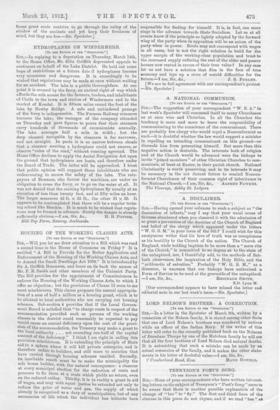HOUSING OF THE WORKING CLASSES ACTS. [To TIM EDITOR OF
THE "SPECTATOR."] you let me draw attention to a Bill which was read a second time in the House of Commons on Friday P It is entitled " A Bill to Provide for the Better Application and Enforcement of the Housing of the Working Classes Acts, and to Amend the Small Dwellings Act 1899." It is introducedby Sir A. Griffith Boscawen, and bears on its back the names of Mr. F. E. Smith and other members of the Unionist Party. The Bill provides for the appointment of Commissioners to enforce the Housing of the Working Classes Acts, to which I offer no objection; but the provisions of Clause 12 seem to me most mischievous. This clause proposes the annual appropria- tion of a sum of half a million as a housing grant, which is to be allotted to local authorities who are carrying out housing schemes. Sub-section 4 provides that if the Local Govern- ment Board is satisfied that " to charge rents in respect of the accommodation provided such as persons of the working classes in the district could reasonably be expected to pay would cause an annual deficiency upon the cost of the provi- sion of the accommodation, the Treasury may make a grant to the local authority • . . not exceeding one-half of the capital amount of the deficiency." I think I am right in calling this provision mischievous. It is extending the principle of State aid, to a sphere where it will kill private enterprise, and is therefore unfair to builders, and still more to societies that have carried through housing schemes unaided. Secondly, its inevitable result must be to make the municipality the sole house builder, with the natural consequence : a clamour at every municipal election for the reduction of rents and pressure to fix them at a scale which yields no return, even on the reduced outlay. Thirdly, it is in reality a grant in aid of wages, and may with equal justice be extended not only to reduce the price of water and gas, the supply of which already is recognized as a duty of municipalities, but of any necessaries of life which the individual has hitherto been responsible for finding for himself. It is, in fact, one more stage in the advance towards State Socialism. Let us at all events know if the principle so lightly adopted by the forward wing of the party when in opposition will be an axiom of the party when in power. Rents may not correspond with wages in all cases, but is not the right solution to build for the upper margin of the working-class population and trust to the increased supply reducing the rest of the older and poorer houses now rented in excess of their true value P In any case let us not have a solution that flies in the face of true economy and lays up a store of untold difficulties for the future.—I am, Sir, &o., J. S. PURLEY. [We are in full agreement with our correspondent's protest —ED. Spectator.]






































 Previous page
Previous page